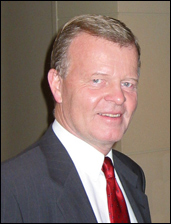Peter Schnohr
Year: June 12th, 2003
Location: Copenhagen, Denmark
Interviewed by: Blackburn, Henry
Abstract
Peter Schnohr came to epidemiology through an interest in athletics. While finishing his medical training in his native Denmark, Schnohr became intrigued by the fitness of Danish bicycle champions. After publishing an article about fitness of cyclists in The Lancet in 1971, he was invited to attend a six-week summer seminar, the Epidemiology Research Training Program, at the University of California at Berkeley. Returning to Denmark a ‘trained epidemiologist,’ Schnohr spent the majority of his career researching physical activity and athleticism as tools for CVD prevention. He makes it clear that academic CVD epidemiology in Denmark is very different from other countries since there are no formal university positions in the field.
Throughout this interview, he discusses the Copenhagen City Project, a prospective study he established, differences in cultural attitudes towards exercise and health, the importance of assessing risk factors, and the major figures in Danish epidemiology. It is a “private enterprise in epidemiology, in contrast to the government-sponsored Glostrup Study and, after 30 years, has entered the classic ranks of observational studies with numerous reports and theses. The study has data on ECHO findings, ejection and ventricular dysfunction and long follow-up, and considers psychosocial variables such as “well-being,” and physiological aging, baldness, and graying, effects of diuretics on hearing, and both relative and absolute risk associated with different risk factors, including exercise, at different ages and by gender.
Schnohr today has the ‘ultimate’ opportunity of long-term observational studies within the combined Glostrup and Copenhagen City studies of some 30,000 subjects, and now focuses on shorter-term metabolic studies in smaller experimental groups in preference to mounting major population interventions. (Henry Blackburn)
Quotes
I should maybe want to start that it has been rather difficult for Danish cardiologists to go into prevention. There I look at my Nordic colleagues in Sweden, Finland, Norway they have had that [opportunity] for centuries almost before us. And they have positions… formal positions in epidemiology and we don’t have that in Denmark. And maybe Denmark is the best country to do epidemiology because you can follow the participants from the start to the end within total deaths, cause-specific deaths [are formally recorded everywhere] if you are going to hospitals you have a register for what was the cause of hospitalization and so on. But it has never been really looked at as a high-level [academic] area.
The Hollywood Bandage Anecdote
Peter Schnohr’s father (a prominent Danish surgeon) was writing his thesis in August Krogh’s laboratory in Denmark in the 1930s at the time Ancel Keys came there as a Rockefeller scholar.
PS: And then they became friends and wrote Christmas letters and so on and then the war came and departed and then he came back. As I’ve told you before, he [Keys] had a lot of qualities and he also taught my father how to do his chloride analyses better and faster and how to treat a sprained ankle the right way so he could ski…
HB: The famous Hollywood bandage.
PS: The Hollywood bandage he called it because he thought Ancel Keys was born there. And every Danish doctor today knows what the Hollywood bandage is and he doesn’t know at all why.
HB: Well, you do know there’s a Hollywood connection of Dr. Keys?
PS: My father thought he was born there.
HB: No, he has an uncle who was a world famous actor called Lon Chaney and so that’s where the Hollywood connection came from.
PS: It was some years afterward when he had told about his uncle. My father had a good memory, but he called it Hollywood because he thought he was born there. (4)
Full Transcript Access
Full transcripts of interviews may be made available to those engaged with original materials for scholarly studies by contacting us.
